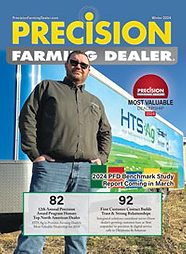A potential loss-leader situation, decreased market share concerns distributors.
Jack Zemlicka, Technology Editor
It’s been almost two months since Monsanto spent nearly a quarter-of-a billion dollars to acquire Precision Planting (PP), the Tremont, Ill.-based company that made its mark developing seed monitoring and planting technology.
Monsanto officials say the sale will advance planting technology through the marriage of PP’s planter optimization and data management systems with the St. Louis-based seed manufacturer’s hybrid prescriptions.
At least one dealer in Iowa, who is a longtime PP seller, is worried that the partnership could result in a loss-leader relationship and shake up the precision equipment retail market.
His primary concern is whether dealers will still have the ability to turn a profit on PP equipment, or if Monsanto will leverage the purchase to offer low or no cost equipment direct to farmers as part of seed agreements.
Such a loss leader scenario played out with seed tenders for the Iowa dealer who saw seed companies “give away” tenders with large volume seed sales. He now has a two-year supply in stock and he doesn’t want to see history repeat itself with Monsanto.
Also on the radar for equipment dealers is what the transaction means competitively for precision equipment manufacturers. With a number of Precision Planting dealerships also selling Pioneer brand seed, at least one dealer wonders what impact Monsanto will have on that relationship, and the larger competitive landscape.
“Pioneer is nervous,” says one Iowa dealer.
A distribution shake-up could open the door for other precision product suppliers to partner with those established Pioneer dealers who also promote PP’s technology. But, it would certainly affect market shares of dealers in some areas where other precision products are already dominant.
Still, there is a general uneasiness in the industry as to what the deal will mean for sellers and growers.
Jeff Reints, a farmer and DeKalb seed dealer in Shell Rock, Iowa, says it’s difficult to predict the impact at this point.
“I don’t know what direction they are going to go,” he says. He sees access to PP technology and software analysis as another revenue stream for his seed dealership, but acknowledged that it would also require another huge time commitment.
Reints also acknowledges there’s a growing concern among his farming peers that Monsanto could use information collected through PP technology for their own gain, including influencing pricing or even selling data to the government.
It seems he’s not alone. According to a recent survey of No-Till Farmer readers, the majority of respondents share those fears. When asked if they worry about the electronic crop data collected from their fields remaining confidential, nearly 60% of the 175 respondents said yes.
When asked if they were concerned that the electronic data gathered by PP products could be shared without their permission with Monsanto, 65% of 174 respondents said yes.
More than 40 respondents also shared comments on the questions, with the majority saying they are worried about data confidentiality.
What the future holds remains to be seen, but a handful of replies revealed an immediate backlash to Monsanto ’s acquisition of PP.
“I will not do business with Precision Planting anymore,” one respondent says.






Post a comment
Report Abusive Comment